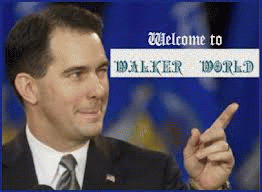"Much of this progress (for working Americans) has been due, I like to think, to the one thing that this Administration from the very beginning has insisted upon: the assurance to labor of the untrammeled right, not privilege, but right to organize and bargain collectively with its employers."
-- Franklin Delano Roosevelt, September 11, 1940
Scott Walker is not averse to flights of fantasy.
But the governor of Wisconsin -- who began August by hosting the annual meeting of the National Governors Association in Milwaukee and then planned to jet off to South Carolina and other key states to promote a 2016 presidential bid -- filled his imagination quota last week when he compared himself with Franklin Delano Roosevelt.
No one with the slightest sense of history could confuse the governor, who has yet to encounter a Wall Street dictate he didn't honor, with the president who said when he sought re-election in 1936:
"We had to struggle with the old enemies of peace -- business and financial monopoly, speculation, reckless banking, class antagonism, sectionalism, war profiteering... Never before in all our history have these forces been so united against one candidate as they stand today. They are unanimous in their hate for me -- and I welcome their hatred."
But, of course, Scott Walker does not have the slightest sense of history.
That was painfully obvious when last week, in an appearance before a Governmental Research Association conference, the governor asserted:
Click Here to Read Whole Article
"The position I pushed is not unlike the principle that Franklin Delano Roosevelt -- not exactly a conservative -- pushed as well when it came to public sector collective bargaining. He felt that there wasn't a need in the public sector to have collective bargaining because the government is the people. We are the people. And so what we've done is to be able to empower our great employees, to affirm them."
Walker was referencing a popular fantasy among anti-labor fabulists.
Unfortunately, the theory loses something in translation.
Back in 1937, Roosevelt did write that "the process of collective bargaining, as usually understood, cannot be transplanted into the public service."
The comment came in a letter from the president to the National Federation of Federal Employees, in which he did, indeed, express his conviction that "upon employees in the Federal service rests the obligation to serve the whole people, whose interests and welfare require orderliness and continuity in the conduct of Government activities."
But Roosevelt's letter was not an anti-labor diatribe like one of Walker's rants about "big union-sponsored mercenaries" and "bare-knuckle union attacks."
Roosevelt began his letter celebrating the twentieth anniversary of the federal employees union with a declaration that "organizations of government employees have a logical place in Government affairs."
"The desire of Government employees for fair and adequate pay, reasonable hours of work, safe and suitable working conditions, development of opportunities for advancement, facilities for fair and impartial consideration and review of grievances, and other objectives of a proper employee relations policy, is basically no different from that of employees in private industry," continued Roosevelt, who expressed the view that organization on the part of public employees "to present their views on such matters is both natural and logical."
It was Roosevelt's respect for government -- and his understanding of "the special relationships and obligations of public servants to the public itself and to the Government" -- that led him to focus on what he understood as the distinct nature of labor relations at the federal level. But to suggest that the 30-second president -- who signed the National Labor Relations Act into law and famously declared: "It is one of the characteristics of a free and democratic modern nation that it have free and independent labor unions" -- set the stage for Walker's anti-union politics is absurd.
Roosevelt did not want strikes to disrupt public safety and public service. But he recognized the "logical place" of public employee unions as representatives of federal workers. And it was in no small measure because of his pro-labor sentiment that the National Federation of Federal Employees exists to this day -- as the representative of 110,000 federal workers at 40 agencies and departments.






